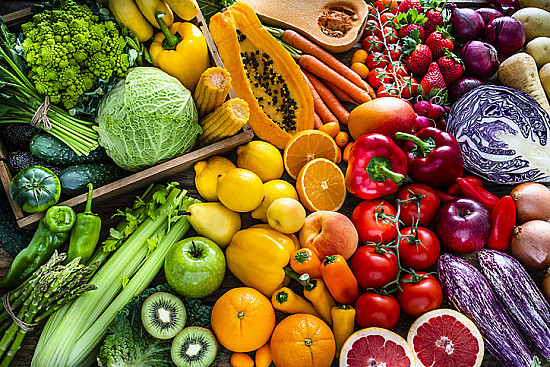Discover the Top 14 Fruits and Vegetables for a Healthy Heart

A healthy heart is essential for overall well-being. A balanced diet is one of the most important factors in maintaining a healthy heart. Fruits and vegetables are an important part of a heart-healthy diet as they are low in fat, calories, and sodium while being high in fiber, vitamins, minerals, and antioxidants. In this post, we will discuss the top fruits and vegetables that are good for the heart.
- Berries: Berries are a rich source of antioxidants that help to protect the heart from damage caused by free radicals. Berries such as strawberries, blueberries, blackberries, and raspberries are low in calories and high in fiber. They are also rich in vitamin C, which helps to reduce the risk of heart disease.
- Leafy Greens: Leafy greens such as spinach, kale, and collard greens are rich in vitamins and minerals that are important for heart health. They are low in calories and high in fiber, which helps to lower cholesterol levels and reduce the risk of heart disease. Leafy greens are also rich in antioxidants such as lutein and zeaxanthin, which protect the heart from damage.
- Avocado: Avocado is a rich source of monounsaturated fats that help to lower cholesterol levels and reduce the risk of heart disease. Avocados are also high in fiber, potassium, and antioxidants that help to protect the heart from damage.
- Tomatoes: Tomatoes are rich in lycopene, an antioxidant that helps to reduce the risk of heart disease. They are also low in calories and high in fiber, which helps to lower cholesterol levels and reduce the risk of heart disease.
- Citrus Fruits: Citrus fruits such as oranges, grapefruits, and lemons are rich in vitamin C, which helps to reduce the risk of heart disease. They are also low in calories and high in fiber, which helps to lower cholesterol levels and reduce the risk of heart disease.
- Apples: Apples are high in fiber and antioxidants that help to reduce the risk of heart disease. They are also low in calories and help to lower cholesterol levels.
- Carrots: Carrots are rich in beta-carotene, an antioxidant that helps to reduce the risk of heart disease. They are also low in calories and high in fiber, which helps to lower cholesterol levels.
- Broccoli: Broccoli is rich in vitamins and minerals that are important for heart health. It is also low in calories and high in fiber, which helps to lower cholesterol levels and reduce the risk of heart disease.
- Pomegranates: Pomegranates are rich in antioxidants, particularly polyphenols, that help to protect the heart from damage caused by free radicals. These antioxidants also help to reduce inflammation, lower blood pressure, and improve blood flow to the heart. Pomegranates are also a good source of fiber, vitamins, and minerals that promote heart health.
- Bell peppers: Bell peppers are low in calories and high in fiber, making them an ideal addition to a heart-healthy diet. They are also a good source of vitamins and minerals, particularly vitamin C, which helps to reduce the risk of heart disease by preventing the oxidation of LDL (bad) cholesterol.
- Grapes: Grapes are rich in antioxidants, particularly resveratrol, which helps to protect the heart from damage and reduce the risk of heart disease. Grapes are also a good source of fiber, vitamins, and minerals that support heart health. Additionally, consuming red grapes or drinking red grape juice has been shown to improve blood flow and lower blood pressure.
- Sweet potatoes: Sweet potatoes are a rich source of beta-carotene, an antioxidant that helps to protect the heart from damage caused by free radicals. They are also high in fiber, vitamins, and minerals, particularly potassium, which helps to regulate blood pressure and reduce the risk of heart disease.
- Spinach: Spinach is rich in vitamins and minerals that promote heart health, particularly vitamin K, which helps to prevent the buildup of calcium in the arteries. It is also high in antioxidants, particularly lutein, and zeaxanthin, that protect the heart from damage.
- Garlic: Garlic has been shown to reduce the risk of heart disease by lowering blood pressure, reducing cholesterol levels, and preventing the formation of blood clots. It is also high in antioxidants that help to protect the heart from damage.
Incorporating a variety of fruits and vegetables into your daily diet is important for maintaining a healthy heart. These nutrient-dense foods not only provide essential vitamins and minerals but also help to reduce the risk of heart disease by protecting the heart from damage caused by free radicals, reducing inflammation, and regulating blood pressure. Aim for at least five servings of fruits and vegetables per day to ensure that you are getting the nutrients your heart needs to stay healthy.


















